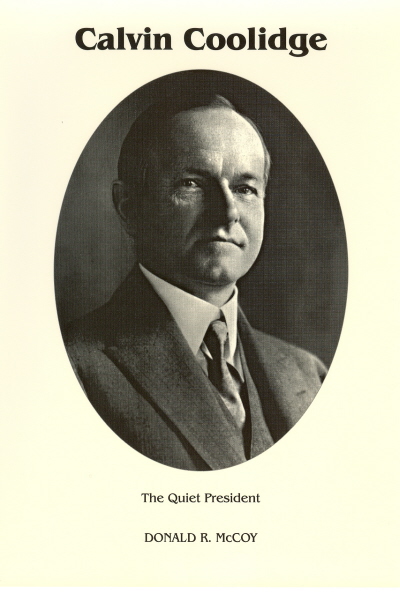CALVIN COOLIDGE: THE QUIET PRESIDENT
by Donald McCoy
ISBN 978-0-945707-23-3 $35.00
472 pages including references and index. Eight pages of illustrations.
Professor McCoy, a specialist in
twentieth-century American affairs, has spent seven years on the preparation
of this present study, which is both a biography and an assessment of, in
the author's words, "a politician who was less than crafty, a President
who deserves some praise and much understanding along with criticism."
Calvin Coolidge came of yeoman Vermont forbears, a diminishing
class in new England even when he was born in 1872. "He came," says
McCoy, "from those who were content to do with what they had, those who
held to high moral standards, who had little interest in seeing what lay
beyond the nearest ridge." After his graduation from Amherst he had
a law office of his own, and then entered politics, progressing from councilman
in Northampton - a post where "little was expected of him, and he lived
up to the expectation" - to the state senate and then the governor's mansion.
A police strike in Boston made him a national figure; and he received the
nomination for vice president from the Republican Convention of 1920, taking
over as President after Harding's death in 1923. His finest speech,
"Have Faith in Massachusetts," when he was made president of the Massachusetts
senate in 1914, is also the best statement of his philosophy. He
said, in part: "Do the day's work. If it be to protect the rights
of the weak, whoever objects, do it... If it be to help a powerful
corporation to serve the people, whatever the opposition, do it... Don't
expect to build up the weak by pulling down the strong. Don't hurry
to legislate. Give administration a chance to catch up with legislation."
As President of the United States he "did the day's work"
with integrity. He restored the dignity of the Presidency after Harding
had tarnished it, and his reputation for honesty dampened much of the Teapot
Dome scandal. He was a man of courage and a skillful administrator.
He was certainly no crusader, but the times did not seem to demand one.
Neither he, or the majority of the American citizenry, had the vision to
foresee what "lay beyond the nearest ridge," the Great Crash (which same
after Coolidge left office), and the European totalitarianism of the 1930s.
Not the least of the virtues of this distinguished biography
is the author's analysis of the workings of the American political system
from the grassroots level to he Capitol, and his ability to enliven by
his writing an administration that seemed wooden in its own time.



